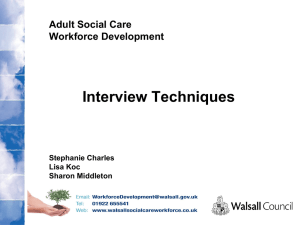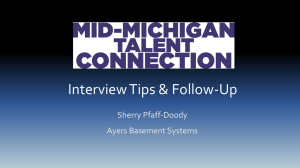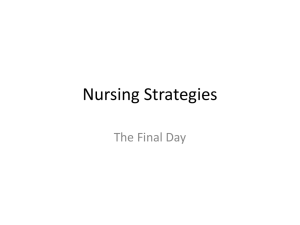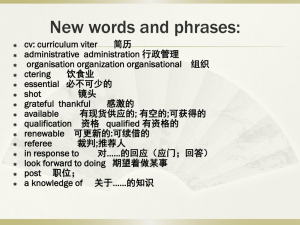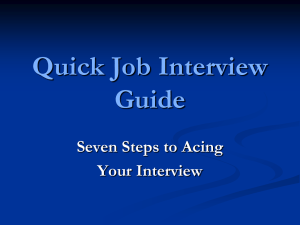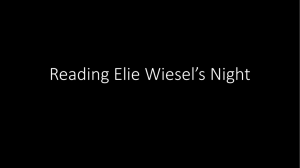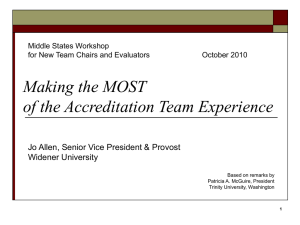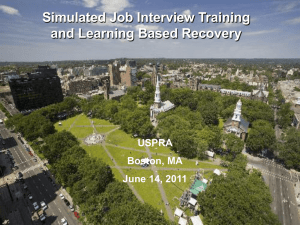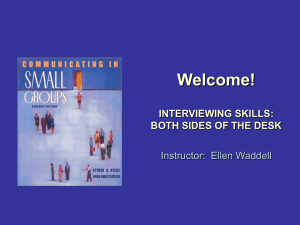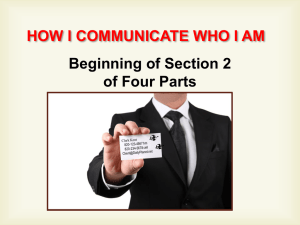III Client Interview Skills 2013
advertisement
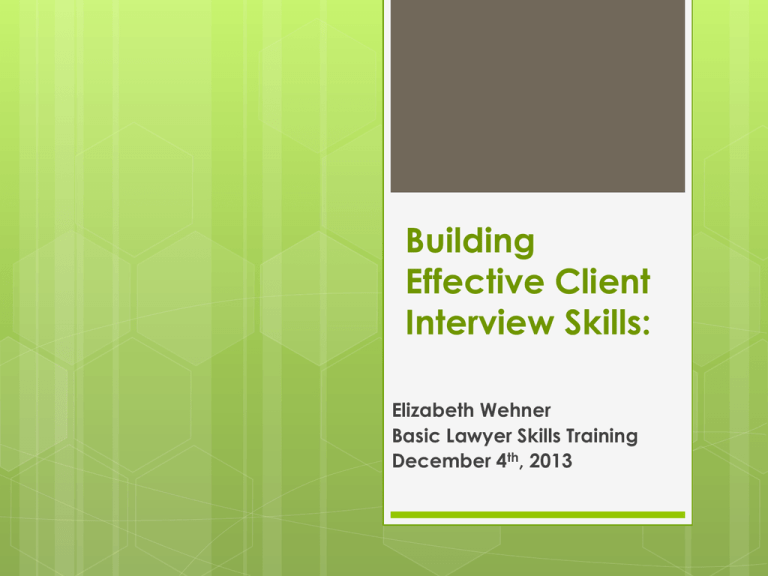
Building Effective Client Interview Skills: Elizabeth Wehner Basic Lawyer Skills Training December 4th, 2013 Building Effective Client Interview Skills Real World Legal Services Translation -How to: 1) put your client at ease and gain her trust (2) so you can elicit critical legal information to assess her case . . . Building Effective Client Interview Skills Real World Legal Services Translation -How to: 1) put your client at ease and gain her trust (2) to elicit critical legal information and assess her case . . . (3) while her screaming toddler scribbles on your walls. Agenda: 1) Basic Interview Assumptions 2) Setting the Stage and Doing your Homework Demonstration 3) Conducting the Interview Demonstration 4) When the circumstances are less than ideal … 5) Some final tips Basic Interview Assumptions: What are the qualities of someone who is an effective interviewer? (Legal or otherwise?) 2 minute discussion in pairs to identify a few qualities and report at least one to the group. An Effective Interviewer: Well prepared / has done homework Puts you at ease Listens carefully Curious – asks good follow up questions An Effective Interviewer: Acts like a real lawyer Manages expectations Explains what comes next by way of follow up Setting the Stage and Doing your Homework: Setting the Stage and Doing your Homework: Five minute discussion with partner: how could attorney preparation have made for a better interview? Prepare to report back something you saw or something she could have done. Setting the Stage and Doing your Homework: Review all relevant and available documents in advance: Client paperwork (DHHR letters, pleadings, notices) Areas of law that apply Checklists, statutes, model pleadings Setting the Stage and Doing your Homework: Make sure your interview space is ready: Tidy and clear of confidential material “Intake” documents available (authorization, retainer, HIPPA form, etc). Distraction free If your office isn’t, seek other options. Conducting the Interview: Conducting the Interview: Five minute discussion with partner: what did you see that worked well and what could be improved? Prepare to report back an observation on the interview. An Effective Interview: Balances Structured and Open ended Discussion Balancing Structured with Open Ended: Introductions, confidentiality, any time constraints, sign forms if in person, what we’ll do today So tell me what is going on with your case at DHHR/ your housing situation/ the situation that led you to file the EPO? Your clarifying follow up questions – mix closed/ opened ended questions here. Wrap up and clear outline of next steps by both you and client. Interviewing goals: Client: Wants “help” (mainly understood as direct rep) with perceived legal problem Wants to tell story to respectful, attentive listener Attorney: Assess viability of legal claims Assess credibility & strengths as witness Assess negative factors in case Manage expectations as needed How can you assess the negative factors in the case? Two minute discussion with partner: how can you get a sense of your case’s weaknesses and how does that impact your interview? Prepare to report back. How can you assess the negative factors in the case? Even if it’s not true, what are the 3 worst things the other side will say about you? What is the other side going to say about you as a tenant/ employee? Ask the key follow ups – especially when drugs/ criminal activity/ abuse are raised Probe what evidence exists to support case If need be, condition direct representation on confirming strengths of case via outside proof, and clearly notify client as to timeline. Wrapping up the interview: Ask client if anything else at all they think you need to know. If you learn/ know case will terminate as advice, review the advice with the client and explain why not providing direct rep. Explain what will happen next. Provide contact information to client for follow up, if needed. Some tricky situations: Toddlers and babies on board Insistent parents, partners, and friends Interviewing at the Courthouse Clients with unreasonable expectations Belligerent clients Phone interviews (3rd parties in room, safety issues, when do they make sense) Discuss your assigned situation for 5 minutes and report back your suggestions and tips. Tips on Tricky Situations: Toddlers and babies – keep small toys on hand, interview in a room without “attractive nuisances,” cut short if needed 3rd parties: Explain that bring only client in as an office policy. Maintains privilege. May bring 3rd part in separately if witness. Courthouse: Know/ ask about private spaces to interview. Avoid if possible. Tips on Tricky Situations: Clients with unreasonable expectations: Be calm, factual and clear with client if her goal is unreasonable - e.g., denying all contact with children not supported by law, you will lose a Fair Hearing on this, not enough lawyers for direct rep for all. Belligerent clients: Seek back up if in person, use safety plans if needed, ask to call back when can talk calmly. Office trainings on dealing with difficult clients can be helpful. Tips on Tricky Situations: Phone Interviews: Not preferred if evaluating client for direct rep – more appropriate for brief advice cases. However, can be necessary evil if, e.g. a referred Protective Order case with short notice. For DV cases, ensure that you have a safe number to call. Ask client to go somewhere more private if 3rd parties or kids audible in background and especially if trying to take part in call. Any Questions? Presenter Contact information: Elizabeth Wehner Legal Aid of West Virginia ewehner@lawv.net (304) 343-3013, x2134
